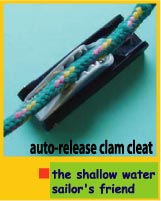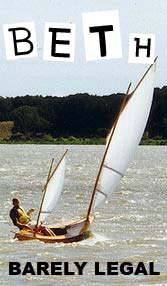An 8 foot, 20 pound, single occupant, fold-up Kayak.

This is the second generation of the Folding Kayak design. It differs from the first with an additional poly seal along the mated folding panel edges, and the fact that it can accommodate a Trolling Motor. The bottom curvature has been reduced to provide greater buoyancy, and freeboard, and the stern widened to support the optional motor. Also, the hull now folds in half, to provide a 4 foot folded length for minimal storage, and transport in any vehicle. Otherwise, the two designs are similar in performance.
| Specifications |
| OAL |
- |
8 feet |
| OAW |
- |
29 inches |
| OAH |
- |
14 inches |
| WLL |
- |
87 inches |
| Weight |
- |
20 pounds |
| Hull Speed |
- |
4 mph |
| Draft |
- |
4 inches |
| Capacity |
- |
225 pounds |

AT THE WATER
The first time at the lake proved to be uneventful, but I carried extra Tough Tape, and a bail bucket and sponge on board, just in case. You can see by the date stamp on the attached photos just how long it takes to get the KWIKY water ready, a little more than 2 minutes. The first thing I did was to venture only a few feet out onto the water, and waited for any possible water to seep into the inside. This was in February, the water was cold, and I did not want to go for a swim that soon in the year. After paddling around for a about 15 minutes it was obvious that no water leak was evident, and so I then decided to try the Trolling Motor option.

Securing the motor mount, 15 pound trolling motor, 45 pound deep-cycle battery, and steering ropes took about 5 minutes, and then it was time to see how much the water line had changed. I weigh 160 pounds, and the water line was about 4 inches up from the bottom as a paddle boat (6 inches of freeboard). Now, with the additional weight of about 65 pounds, it was at around 5-1/2 inches. This means there was about 4-1/2 inches of freeboard at center hull. Not bad for this type of hull, but a heavier occupant would reduce this even further. As a result, if you are going to use the trolling motor option, I recommend you weigh no more than 180 pounds, just to be on the safe side.

click image above to enlarge
Other observations were more subjective, such as the possible wandering from side to side while paddling. Not being a frequent kayaker, I thought the wandering was minimal, and acceptable. However, I do not paddle vigorously, and that could make a difference. So if you want more directional stability, apply a rear fin attached to the side of the hull in the transom area. It can be of the permanent or removable type. Also, the seating position and location are occupant specific. While paddling I was comfortably seated center in the hull, with good legroom. However, while under motor power, I had to move forward, to balance the weight of the motor and battery, which is placed behind the seat. This reduces legroom, and I found my feet under the forward tarp cover. Some people with larger feet than mine (size 10) might find this confining. The battery could be moved forward of the occupant for more legroom, requiring a longer power cord.
Building is Easy






Overall I found KWIKY to be comfortable, and quite seaworthy. There was some chop I encountered while motoring that was rough, but the hull passed through it without a problem. I would be nervous, however, addressing larger waves, especially broadside, and for that reason suggest that the boat be used in reasonably protected waters. I always wear a PFD, and you should also. You never know when that big power boat will come by at speed and swamp your little craft. It happens!
KWIKY makes a great little boat for anyone who wants to go out on the water, anytime, in any vehicle, without having to be concerned about transport or storage. It is not a plastic, buy-it and forget-it boat, and it will require some on-going maintenance. But, the entry cost of less than $100 should appeal to all those that want to enjoy the personal freedom that boating offers, if only for a couple of hours at a time.
don't forget to visit www.PortableBoatPlans.Com for new designs and updates.
Happy Boating!
Ken Simpson, Designer
|
















